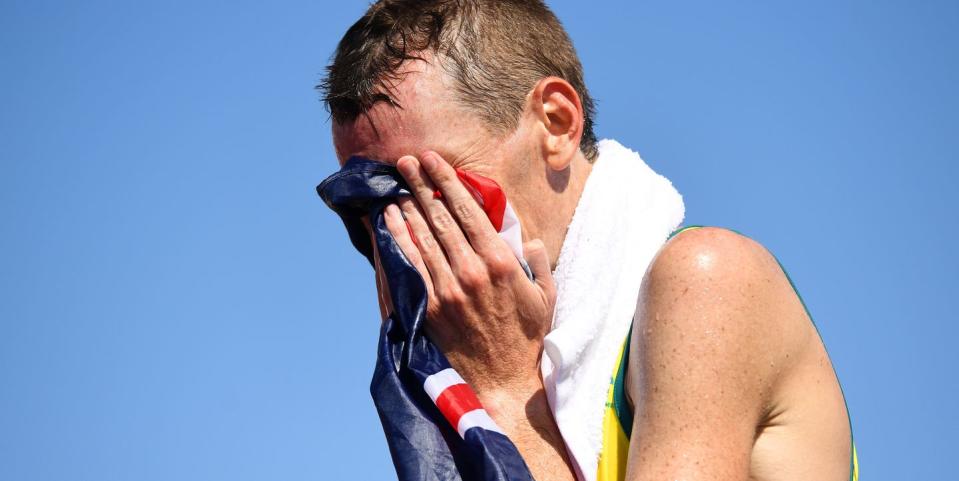It’s Totally Normal to Start Crying While You’re Running

It feels weird to admit this, but there have been multiple times I’ve cried while running. I’m not talking about openly sobbing at a marathon finish line; more like, getting inexplicably teary or choked up on a longer run. Most of the time, it’s not even related to how I feel about running. They’re not tears of exhaustion from double-digit mileage or tears of elation during a really good run. Usually, they come out of nowhere.
Turns out, that’s a totally normal reaction—so if you suddenly find yourself getting choked up regularly on the run, you’re not alone.
Crying on the run seems especially relevant right now, given how many people are using running to cope with unprecendented amounts of stress and anxiety related to COVID-19, widespread issues around systemic racism, and uncertainties and misinformation around the upcoming election. In a survey conducted by ASICS, 79 percent of runners said running is currently helping them feel saner and more in control during this time, and 65 percent of runners say its mental benefits outweigh any other form of physical exercise.
Over 40 percent of Americans reported experiencing increased mental health issues since April, according to a new study from the Centers for Disease Control and Prevention (CDC). And studies show that aerobic exercise can be as effective as anti-depressants in treating mild to moderate depression. So it makes sense that when you run during times of high-stress, you might end up confronting some ~emotions~ out on the road.

So Why Am I Crying?
Think about when you’re most likely to get emotional on the run: Did a certain song, with its empowering lyrics, trigger you? Were you thinking of a great racing experience from your past, or how frustrating it is that you don’t know when you’ll get that again?
During a steady-state endurance activity, your body is almost on autopilot, which frees your mind up to wander. But there’s still a mind-body connection, especially something on the more intense end of the spectrum, like a medium to long run,” says Megan Cannon, Ph.D., a sports psychologist. “Your body is releasing a lot of hormones, and your mind is picking up on that and going to experience a release as well.”
Essentially, your brain is receiving permission to let go. When your body gets tired, so does your brain, says Cannon—and that makes it harder to keep certain feelings that you may be able to ignore at other points during the day at bay.
In an ideal scenario, “your body can enter this flow state where you just feel really comfortable and connected with your activity,” says Hillary Cauthen, Psy.D., executive board member for the Association for Applied Sport Psychology. To scientists, the flow state is a state of consciousness where you feel and perform your best; to runners, it’s a runner’s high.
Whatever you call it, when you settle into that kind of physical state, it can bring out some deeper emotions, says Cauthen. “Flow doesn’t have to be this happy, euphoric, positive feeling,” she explains. “It’s just about being highly connected to your activity, and then allowing your emotions to come forward.”
But What Do the Tears Mean?
Honestly, nothing, really. If you’re using running to cope with certain emotions, then you’re likely going to experience an emotional reaction when you run. And that’s a good thing!
“From the moment that we’re born, we’re low-key taught to judge different emotions: We say don’t be sad or don't be angry or don't be stressed rather than validating these emotional experiences,” says Cannon. “But we need those emotions; they’re a part of being human.”
People are so quick to judge emotional releases, like crying on a run, but there’s really no need to read too much into it. In the moment, “don’t start exploring and trying to figure out why this is happening,” says Cauthen. “Allow yourself to just experience the release. You unlocked something in your body, and this is your body’s way of expressing it.” Afterward, you’ll probably feel a sense of lightness, like you’ve just unloaded something, she adds.
If you can label the reason behind your crying (i.e you had a stressful day at work or you’re worried about a parent who’s sick), that’s great. But it’s more about bringing awareness to your feelings and just accepting where you’re at, says Cannon. “It’s all in the way you frame it,” she explains. “Instead of worrying about why you’re crying, think ‘wow, I'm getting such a great workout that my body is tired enough, it’s allowing me to have this release.’”
Any exercise, to a degree, is a therapeutic experience. And any time you can validate your emotions instead of discounting them, you’re going to end up in a better place. “Although crying during a run may feel uncomfortable, for sure, it’s not a bad thing,” says Cannon.. “It's really just, like...hey, congratulations, you’re human.”
Sign up to the Men's Health newsletter and kickstart your home body plan. Make positive steps to become healthier and mentally strong with all the best fitness, muscle-building and nutrition advice delivered to your inbox.
Love what you’re reading? Enjoy Men’s Health magazine delivered straight to your door every month with Free UK delivery. Buy direct from the publisher for the lowest price and never miss an issue!
You Might Also Like

 Yahoo Finance
Yahoo Finance 